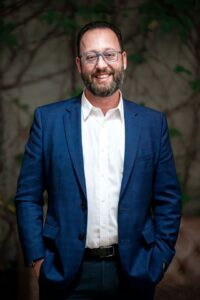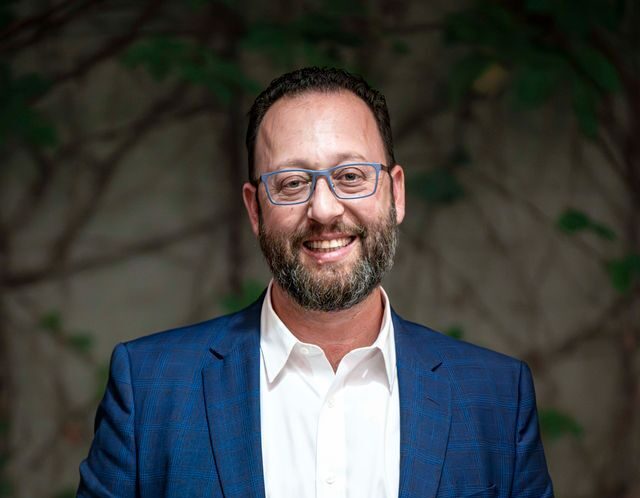 Ben Pery. (Courtesy of American Friends of Tel Aviv University
Ben Pery. (Courtesy of American Friends of Tel Aviv University
The Rockville resident recently appointed CEO of American Friends of Tel Aviv University said the Israeli school is “part of his DNA.”
“I feel this is such a personal position for me because I am from Tel Aviv, both being raised in Tel Aviv and studying there,” Ben Pery told Washington Jewish Week. “I feel like this is the most personal position I [have] ever held professionally.”
Pery, a third-generation Tel Aviv University alumnus, will lead AFTAU’s efforts to raise awareness and funds to support research at the school and build bridges between the United States and Israel, especially as the Israel-Hamas war shows signs of simmering down.
“I look forward to the opportunity to … be able to support Tel Aviv University in this really historic time that we’re in,” he said. “We’re going to move into an era of rebuilding and that really excites me.”
Pery previously served for 13 years as CEO of Momentum, a Rockville-based nonprofit that aims to empower Jewish women and their families. He is credited with helping the organization vastly grow its fundraising base and initiatives. Pery now hopes to grow AFTAU into an organization that raises $100 million per year and positions TAU as the premier global university partner for American donors.
 Tel Aviv University. (Photo by Ynhockey via Wikimedia Commons)
Tel Aviv University. (Photo by Ynhockey via Wikimedia Commons)
“It’s very [well] known in Israel, and it’s really not known enough in the States,” he said of the school, founded in 1956, which currently boasts about 30,000 undergraduate, postgraduate and doctoral students.
Pery added that TAU is home to major technology companies’ laboratories and “important research efforts” that allow the university to “flourish with success around the world.”
To achieve the goal of elevating TAU, Pery plans to boost its brand awareness, clarity, relevancy and engagement. He added that this work might be easier given that a few months ago, TAU received its largest ever philanthropic gift, $125 million, from the Gray Foundation.
Jon Gray, a co-founder of the Gray Foundation, said the grant is aimed at doubling the number of medical students trained annually at TAU’s medical school.
“[He] says it’s an investment; it’s not charity,” Pery said. “So, [we need] to bring awareness of that. … I think philanthropists understand that when they’re looking to invest in Israel’s future, [a] university — Tel Aviv University, specifically — is a very smart place to invest.”
In the grand scheme of things, it’s about the money, specifically major philanthropic gifts, Pery said: “It actually brings awareness and pools all the other gifts as well.”
“I will focus on major gifts [and] foundations, but then I really believe in engagement and partnerships,” he said. “Once you are able to invest in a strong engagement of your alumni, then all the lay leaders, donors will get involved.”
That’s only one part of the proverbial pyramid of needs. Pery plans to strengthen AFTAU’s network, whether that be researchers associated with the university who are now teaching in the U.S. or the more than 20,000 alumni across the country.
“Once you’re able to invest in a strong engagement campaign, it helps with the first point of brand awareness, but it also leads to grow the relevancy of why you should give to the university,” he said.
He plans to work on building regional areas of support between TAU alumni, strengthen social media campaigns and drum up small donations. The latter practice is “not a strong culture in Israeli universities, and I believe that we can learn from American ones,” Pery said.
During his time at the helm of Momentum, Pery said he became “more American than Israeli, at least professionally.” He said he believes AFTAU’s board tapped him as CEO due to his deep understanding of American Jewish culture, the nonprofit world, and science and art.
“Personally, I hope I’ll be able to connect and make a strong bridge between the university in Israel, run by Israelis, and the American Friends of Tel Aviv University, which is American, and hopefully [allow] us to work together efficiently and effectively,” Pery said.
This work is particularly meaningful to him, as an Israeli-born nonprofit leader who’s lived in both nations.
“I believe that the university is … literally the future of the State of Israel,” Pery said. “If you talk about academia, leadership, business, tech, it’s really the best place to invest in Israel’s future and I hope to strengthen Israel-U.S. relations.”
